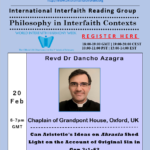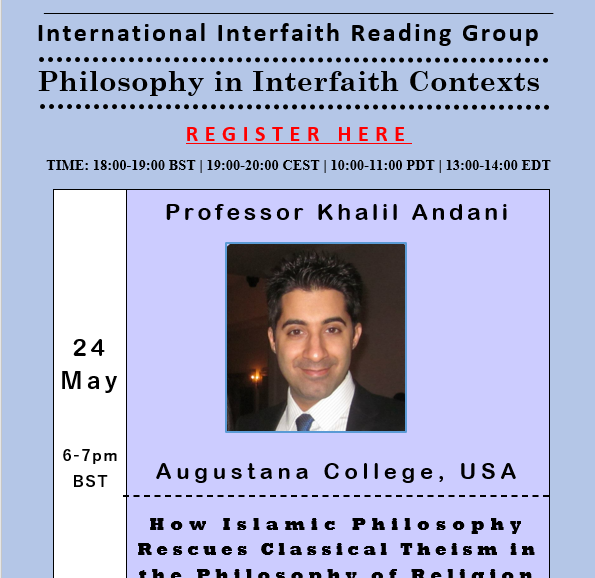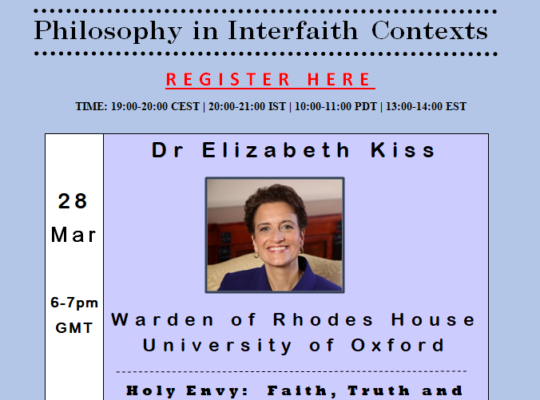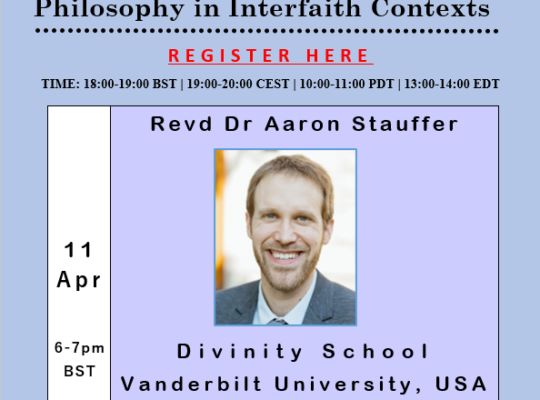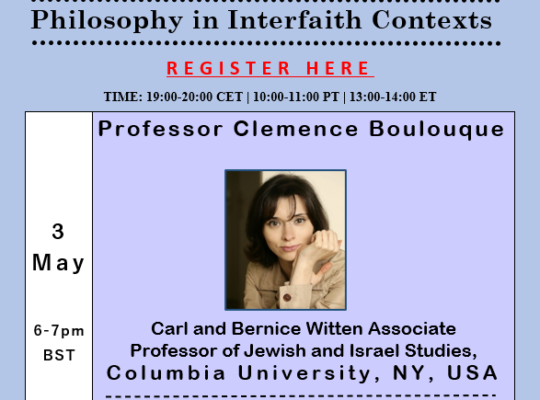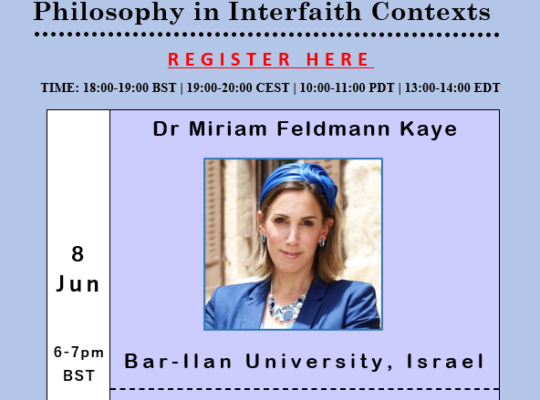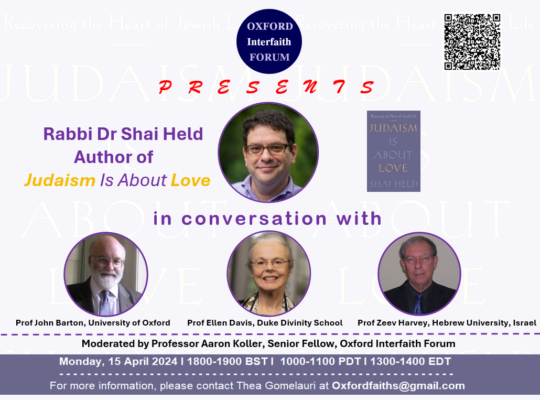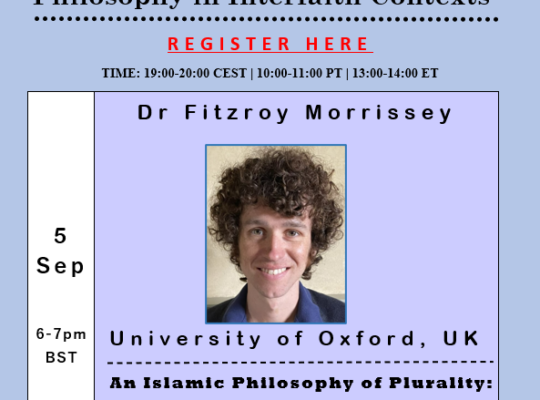(Postponed until further notice)
We are deeply honoured to welcome Professor Khalil Andani, Augustana College, USA, to lead a session of the Philosophy in Interfaith Contexts Reading Group.
Here are the details of this fascinating session.
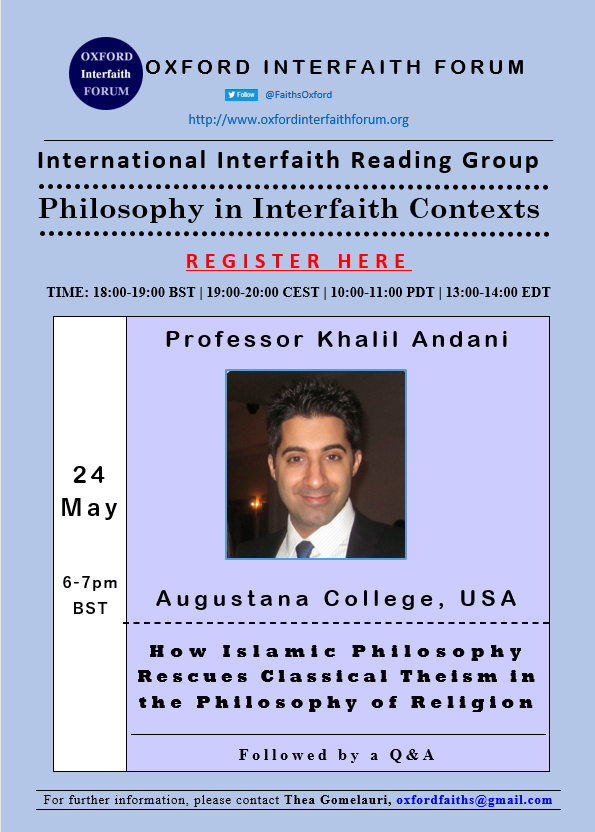
Topic: How Islamic Philosophy Rescues Classical Theism in the Philosophy of Religion
Abstract: The Philosophy of Religion remains saturated with Christian philosophical projects that serve the interests of Christian theology and is a field in dire need of interfaith encounters. One of the major theistic perspectives in this field is called “Classical Theism” – which posits that God is independent (a-se), absolutely simple (without metaphysical parts of any kind), immutable, impassable, timeless, omniscient, and omnipotent. In recent years, Classical Theism has come under intense attack from various Christian philosophers including Alvin Plantinga, William Lane Craig, and Ryan Mullins. In their theistic models – called “Neo-Classical Theism” – God is metaphysically complex, passable, and temporal in certain respects. Many of their arguments specifically target Christian versions of classical theism – like Anselmian or Thomistic theism – and evoke Christian concerns such as the Trinity, the Incarnation, and divine providence in their attacks. For example, Plantinga and Craig have argued that the Classical Theism formula that “God is identical to His attributes” is unintelligible; Mullins has argued that a timeless God cannot create a Cosmos that began to exist and cannot truly interact with His creatures; several scholars have argued that Classical Theism suffers from the problem of modal collapse – that God creates the Cosmos out of absolute necessity, which collapses all contingent beings into necessary beings like God. However, there are other forms of Classical Theism found in the intellectual traditions of Islam. These include Avicennian, Ismaili, and Sufi-Akbari versions of Classical Theism. My argument is that Islamic Classical Theism – in one or more of its versions – fares better than its Christian counterparts and easily meets the challenges of Plantinga, Craig, and Mullins. The Muslim Classical Theist can affirm strong divine simplicity without needing to affirm any distinctions within God such as the Trinity; Avicennian and Ismaili accounts of divine predication overcome the Plantingian objections; the Neoplatonic cosmologies of the Islamic philosophers and mystics solve the model collapse objection and nullify the arguments against divine timelessness. Finally, the Ismaili and Akbari doctrine of God’s highest self-manifestation in the form of the Muhammadan Reality allow creatures to have genuine relationships with God.
Speaker: Professor Khalil Andani is an Assistant Professor of Religion at Augustana College. He holds a PhD, MA, and MTS degrees in Islamic Studies from Harvard University. He specializes in Qur’anic studies, in Islamic intellectual history, Sufism, Ismailism, and the global philosophy of religion. His book project is a history of the theologies and conceptions of Revelation in Islam, based on his PhD thesis that won the 2020 Best Dissertation of the Year from the Foundation for Iranian Studies.
Professor Andani’s publications include articles in Zygon, Journal of Sufi Studies, Oxford Journal of Islamic Studies, Religion Compass, The Routledge Companion to the Quran, The Oxford Handbook of Islamic Philosophy, and the European Journal of Analytic Philosophy.
Chair: Professor Syed Atif Rizwan, Assistant Professor of Islamic and Interreligious Studies, and Director of the Catholic-Muslim Studies Program at Catholic Theological Union, USA, and Senior Fellow of the Oxford Interfaith Forum.
Date: 24 May, 2023
Time: 18:00-19:00 BST | 19:00-20:00 CEST | 10:00-11:00 PST | 13:00-14:00 EST
Venue: online
After registering, you will receive a Zoom email containing information about joining the meeting. If you do not see the zoom email in your inbox, please, check your spam folder.
If you would like to join the Philosophy in Interfaith Contexts Reading Group, please sign up here.
Related Sessions
- Book Launch: Judaism Is about Love
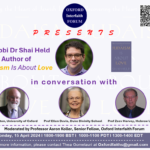
- When Salafi Muslims Meet Evangelical Christians: A Hopeful Dispatch from the United States
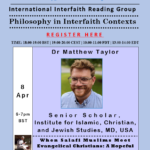
- The Ties That Bond Us: Differences of Sacred Values in Interfaith Organizing
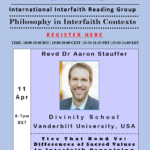
- The Varieties of Atheism: Connecting Religion and Its Critics
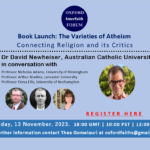
- Interfaith Just Peacemaking: Christian and Muslim Resources for Restorative Justice

- Making Sense of “GOD”: What God-Talk Means and Does
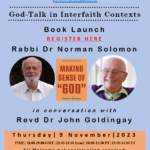
- How Islamic Philosophy Rescues Classical Theism in the Philosophy of Religion
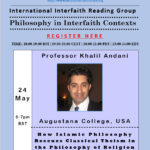
- Holy Envy: Faith, Truth and Interfaith Understanding
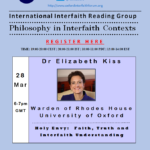
- Doing Comparative Theology Through a Decolonial Lens
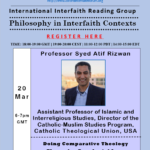
- A Jewish Philosophical Approach to Interfaith Relations: Re-reading Genesis According to Rabbi Jonathan Sacks
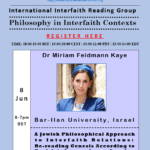
- Matteo Ricci and the Problem of Religious Translation
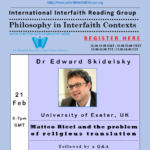
- Human Equality and Abrahamic Monotheism
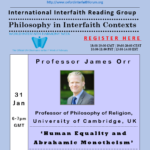
- Moral and Spiritual Courage: A Muslim Perspective
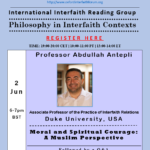
- A Religious Crucible: Elia Benamozegh (1823-1900), Jewish Universalism and Interreligious Encounters
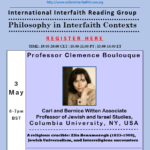
- Reaching beyond Metaphysics: God of Love, God beyond Being in Two Traditions
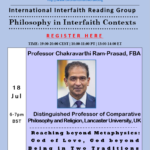
- Embodied Cognition and the Soul: Lessons from Cognitive Science and Christian Eschatology
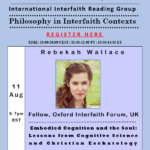
- An Islamic Philosophy of Plurality: Shah Waliullah of Delhi (1703-62) on the Unity and Diversity of Humanity
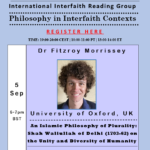
- Holistic Wisdom from a Chinese Perspective
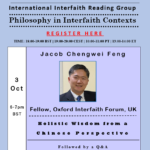
- HMD 2023: Development in Catholic Teaching about and Relations with Jews since World War II
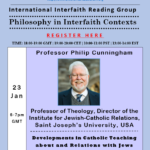
- Historical Suffering and Agency: Alternative Conceptions of Power in the Jewish Philosophical Thought of Hermann Cohen
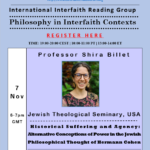
- How Christians Can Learn from the Devotional Poetry of Hindu South India
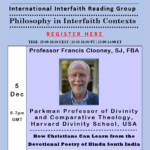
- Can Aristotle’s Ideas on Akrasia Shed Light on the Account of Original Sin in Gen 3:1-6?
